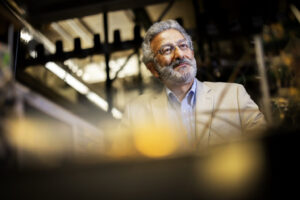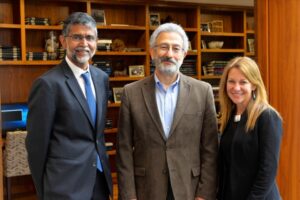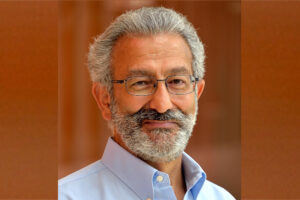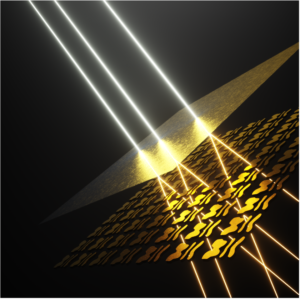by Nathi Magubane & Ian Scheffler

According to Chinese legend, the first cup of tea was an accident. Shennong, a mythical emperor, boiled a pot of water, only for the wind to add a handful of leaves.
In Penn Engineering’s Department of Electrical and Systems Engineering (ESE), tea leaves likewise result in happy accidents.
Nader Engheta, H. Nedwill Ramsey Professor, regularly joins his colleague Firooz Aflatouni, associate professor and undergraduate chair in ESE, for a cup of tea in the latter’s office. “We talk about academic life,” says Engheta. “We talk about history, politics.” And, of course, science.
Engheta, who won the Benjamin Franklin Medal last year, is known for his groundbreaking contributions to the design of materials that interact with electromagnetic waves at tiny scales with unprecedented functionalities. More than a decade ago, the Department recruited Aflatouni, who specializes in the design of electronic and photonic chips, and Engheta became his mentor. “We come from different angles to the field of optics,” says Engheta.
Over tea, the two brew up new ideas. While perhaps not as directly inspired by teatime as James Watt, who famously experimented with kettles en route to inventing the steam engine, the pair nonetheless finds that ideas rise like the steam from their teacups. “It’s a pleasure to collaborate with Firooz,” says Engheta. “We love to see how we can bring our ideas together.”
Read the full story in Penn Today.
Nader Engheta is H. Nedwill Ramsey Professor of Electrical and Systems Engineering at Penn Engineering, with secondary appointments in the departments of Bioengineering, Materials Science and Engineering, and Physics and Astronomy in the School of Arts & Sciences. Read more stories featuring Engheta in the BE Blog.







